Report on Effective Teaching Pedagogies in Secondary Science
VerifiedAdded on 2023/06/08
|6
|859
|92
Report
AI Summary
This report examines effective teaching pedagogies in secondary science education, focusing on the 7-10 curriculum. It highlights the differences between science teaching and other specializations, emphasizing the need for evidence-based learning and the integration of logic and imagination. The report addresses key issues in student learning, such as the importance of hands-on activities and fostering student curiosity through project-based work and experimentation. It concludes that effective science teaching involves supporting student learning with evidence, balancing logical explanations with imaginative concepts, and incorporating hands-on, student-centered activities. The references include scholarly articles and journals related to science education, intercultural STEAM programs, environmental education, and STEM education policies.
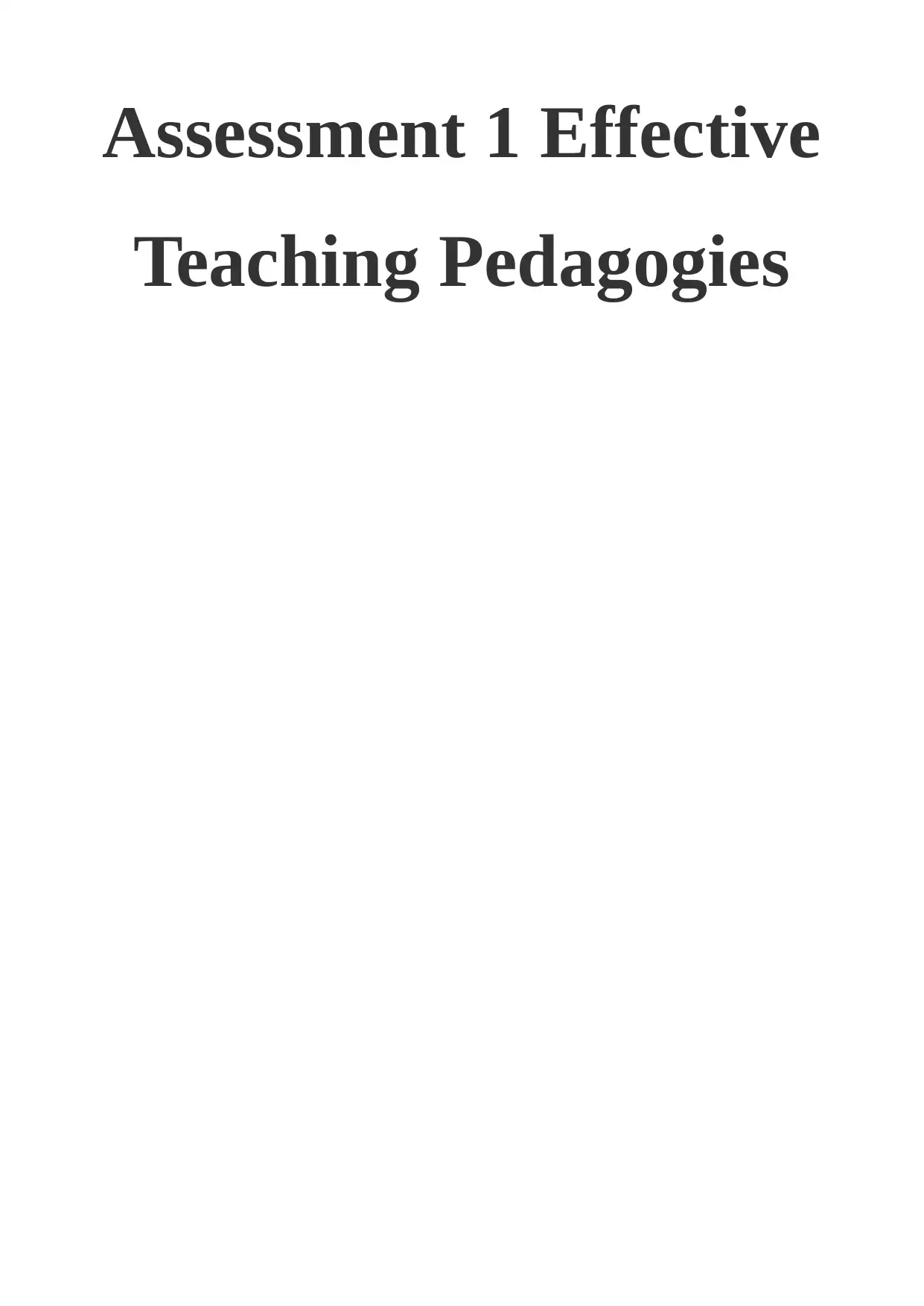
Assessment 1 Effective
Teaching Pedagogies
Teaching Pedagogies
Paraphrase This Document
Need a fresh take? Get an instant paraphrase of this document with our AI Paraphraser
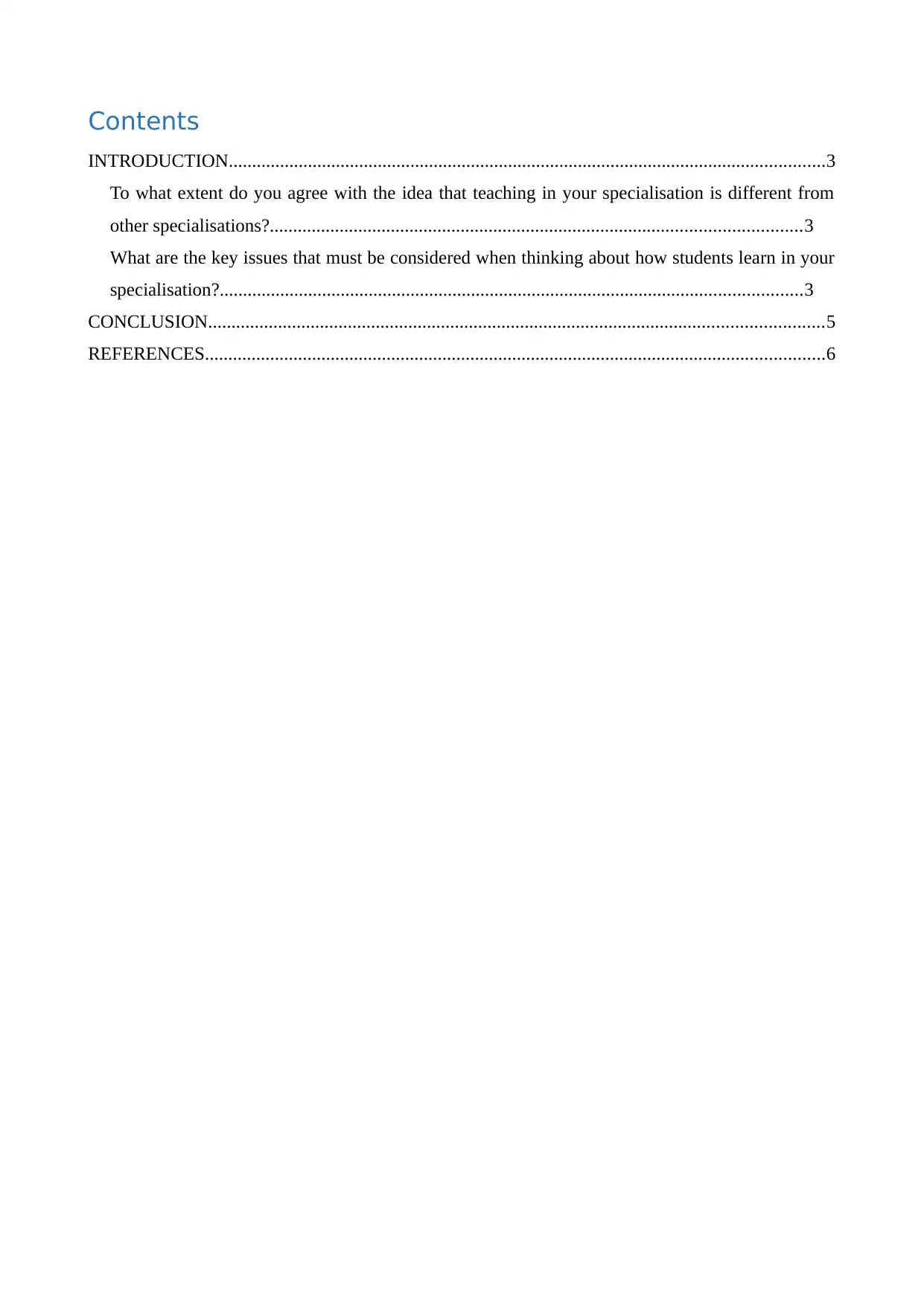
Contents
INTRODUCTION................................................................................................................................3
To what extent do you agree with the idea that teaching in your specialisation is different from
other specialisations?..................................................................................................................3
What are the key issues that must be considered when thinking about how students learn in your
specialisation?.............................................................................................................................3
CONCLUSION....................................................................................................................................5
REFERENCES.....................................................................................................................................6
INTRODUCTION................................................................................................................................3
To what extent do you agree with the idea that teaching in your specialisation is different from
other specialisations?..................................................................................................................3
What are the key issues that must be considered when thinking about how students learn in your
specialisation?.............................................................................................................................3
CONCLUSION....................................................................................................................................5
REFERENCES.....................................................................................................................................6
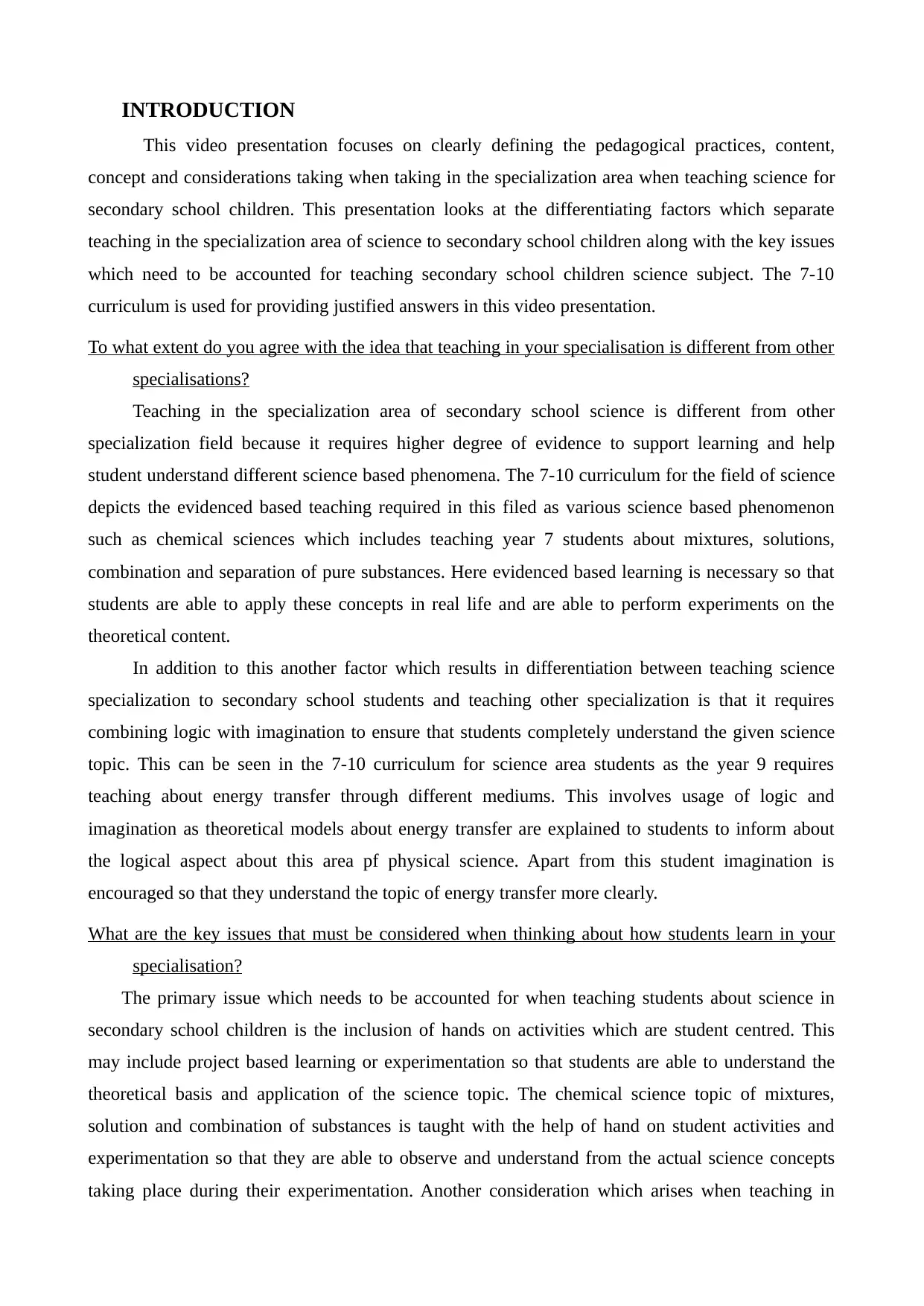
INTRODUCTION
This video presentation focuses on clearly defining the pedagogical practices, content,
concept and considerations taking when taking in the specialization area when teaching science for
secondary school children. This presentation looks at the differentiating factors which separate
teaching in the specialization area of science to secondary school children along with the key issues
which need to be accounted for teaching secondary school children science subject. The 7-10
curriculum is used for providing justified answers in this video presentation.
To what extent do you agree with the idea that teaching in your specialisation is different from other
specialisations?
Teaching in the specialization area of secondary school science is different from other
specialization field because it requires higher degree of evidence to support learning and help
student understand different science based phenomena. The 7-10 curriculum for the field of science
depicts the evidenced based teaching required in this filed as various science based phenomenon
such as chemical sciences which includes teaching year 7 students about mixtures, solutions,
combination and separation of pure substances. Here evidenced based learning is necessary so that
students are able to apply these concepts in real life and are able to perform experiments on the
theoretical content.
In addition to this another factor which results in differentiation between teaching science
specialization to secondary school students and teaching other specialization is that it requires
combining logic with imagination to ensure that students completely understand the given science
topic. This can be seen in the 7-10 curriculum for science area students as the year 9 requires
teaching about energy transfer through different mediums. This involves usage of logic and
imagination as theoretical models about energy transfer are explained to students to inform about
the logical aspect about this area pf physical science. Apart from this student imagination is
encouraged so that they understand the topic of energy transfer more clearly.
What are the key issues that must be considered when thinking about how students learn in your
specialisation?
The primary issue which needs to be accounted for when teaching students about science in
secondary school children is the inclusion of hands on activities which are student centred. This
may include project based learning or experimentation so that students are able to understand the
theoretical basis and application of the science topic. The chemical science topic of mixtures,
solution and combination of substances is taught with the help of hand on student activities and
experimentation so that they are able to observe and understand from the actual science concepts
taking place during their experimentation. Another consideration which arises when teaching in
This video presentation focuses on clearly defining the pedagogical practices, content,
concept and considerations taking when taking in the specialization area when teaching science for
secondary school children. This presentation looks at the differentiating factors which separate
teaching in the specialization area of science to secondary school children along with the key issues
which need to be accounted for teaching secondary school children science subject. The 7-10
curriculum is used for providing justified answers in this video presentation.
To what extent do you agree with the idea that teaching in your specialisation is different from other
specialisations?
Teaching in the specialization area of secondary school science is different from other
specialization field because it requires higher degree of evidence to support learning and help
student understand different science based phenomena. The 7-10 curriculum for the field of science
depicts the evidenced based teaching required in this filed as various science based phenomenon
such as chemical sciences which includes teaching year 7 students about mixtures, solutions,
combination and separation of pure substances. Here evidenced based learning is necessary so that
students are able to apply these concepts in real life and are able to perform experiments on the
theoretical content.
In addition to this another factor which results in differentiation between teaching science
specialization to secondary school students and teaching other specialization is that it requires
combining logic with imagination to ensure that students completely understand the given science
topic. This can be seen in the 7-10 curriculum for science area students as the year 9 requires
teaching about energy transfer through different mediums. This involves usage of logic and
imagination as theoretical models about energy transfer are explained to students to inform about
the logical aspect about this area pf physical science. Apart from this student imagination is
encouraged so that they understand the topic of energy transfer more clearly.
What are the key issues that must be considered when thinking about how students learn in your
specialisation?
The primary issue which needs to be accounted for when teaching students about science in
secondary school children is the inclusion of hands on activities which are student centred. This
may include project based learning or experimentation so that students are able to understand the
theoretical basis and application of the science topic. The chemical science topic of mixtures,
solution and combination of substances is taught with the help of hand on student activities and
experimentation so that they are able to observe and understand from the actual science concepts
taking place during their experimentation. Another consideration which arises when teaching in
⊘ This is a preview!⊘
Do you want full access?
Subscribe today to unlock all pages.

Trusted by 1+ million students worldwide
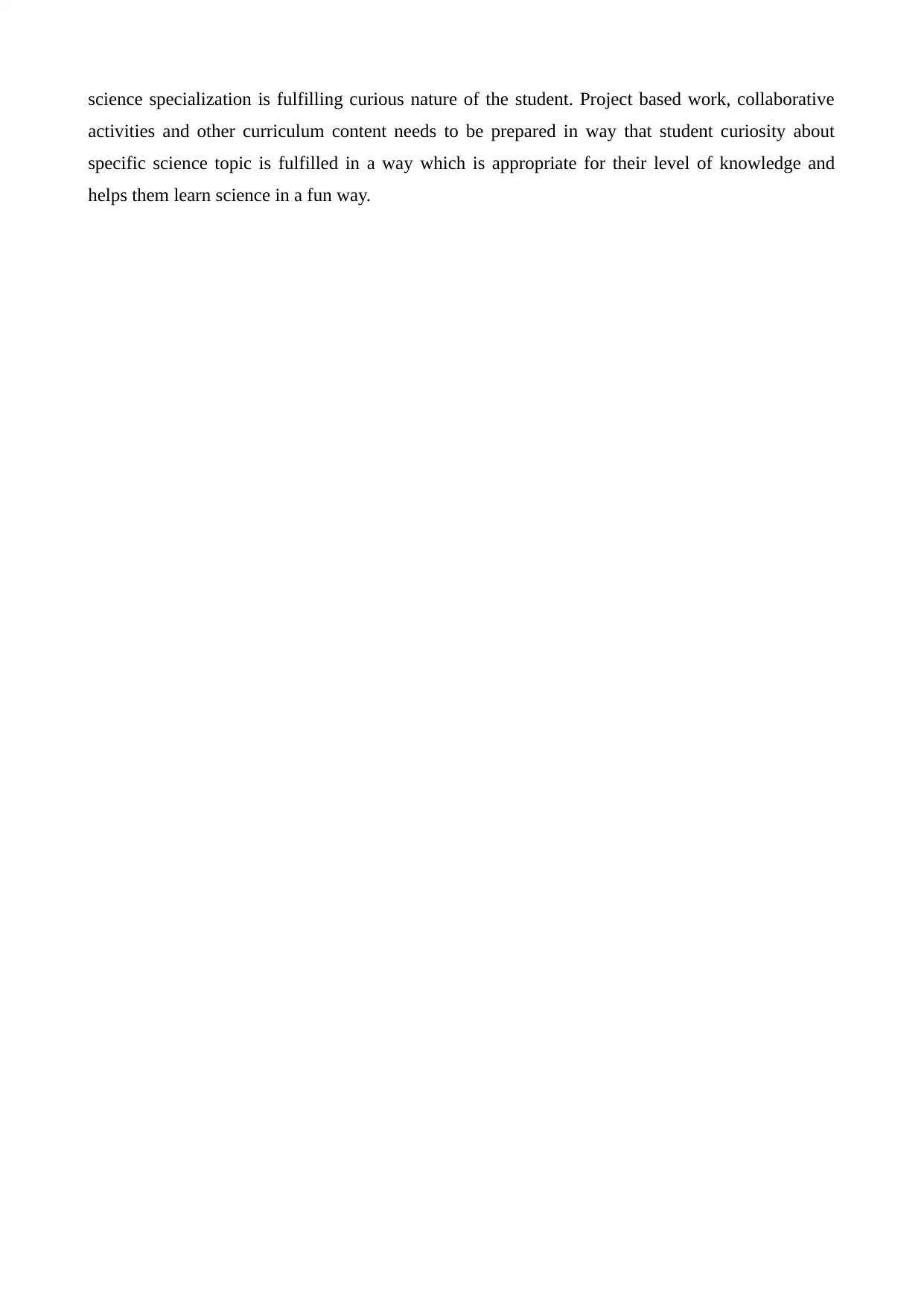
science specialization is fulfilling curious nature of the student. Project based work, collaborative
activities and other curriculum content needs to be prepared in way that student curiosity about
specific science topic is fulfilled in a way which is appropriate for their level of knowledge and
helps them learn science in a fun way.
activities and other curriculum content needs to be prepared in way that student curiosity about
specific science topic is fulfilled in a way which is appropriate for their level of knowledge and
helps them learn science in a fun way.
Paraphrase This Document
Need a fresh take? Get an instant paraphrase of this document with our AI Paraphraser
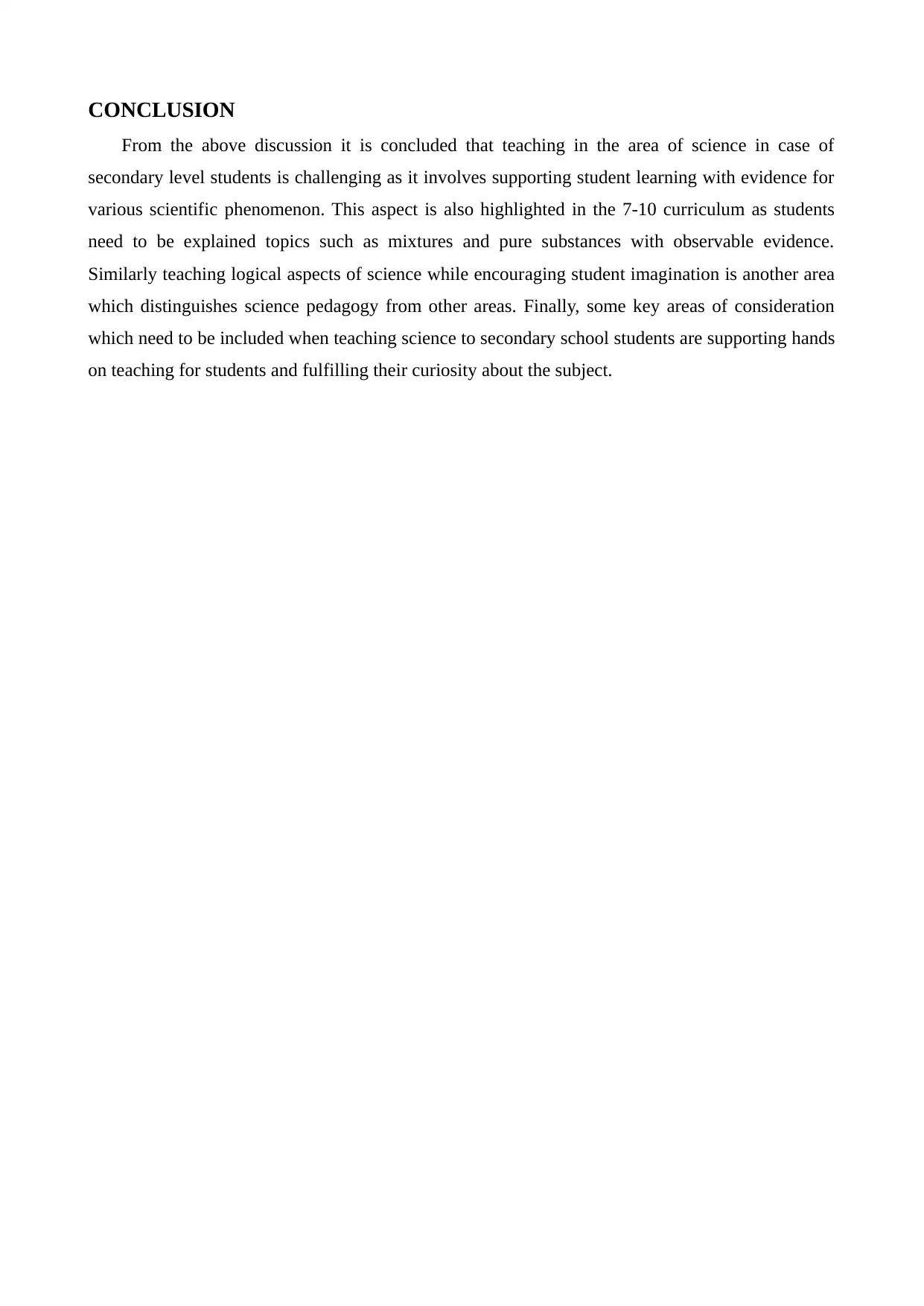
CONCLUSION
From the above discussion it is concluded that teaching in the area of science in case of
secondary level students is challenging as it involves supporting student learning with evidence for
various scientific phenomenon. This aspect is also highlighted in the 7-10 curriculum as students
need to be explained topics such as mixtures and pure substances with observable evidence.
Similarly teaching logical aspects of science while encouraging student imagination is another area
which distinguishes science pedagogy from other areas. Finally, some key areas of consideration
which need to be included when teaching science to secondary school students are supporting hands
on teaching for students and fulfilling their curiosity about the subject.
From the above discussion it is concluded that teaching in the area of science in case of
secondary level students is challenging as it involves supporting student learning with evidence for
various scientific phenomenon. This aspect is also highlighted in the 7-10 curriculum as students
need to be explained topics such as mixtures and pure substances with observable evidence.
Similarly teaching logical aspects of science while encouraging student imagination is another area
which distinguishes science pedagogy from other areas. Finally, some key areas of consideration
which need to be included when teaching science to secondary school students are supporting hands
on teaching for students and fulfilling their curiosity about the subject.
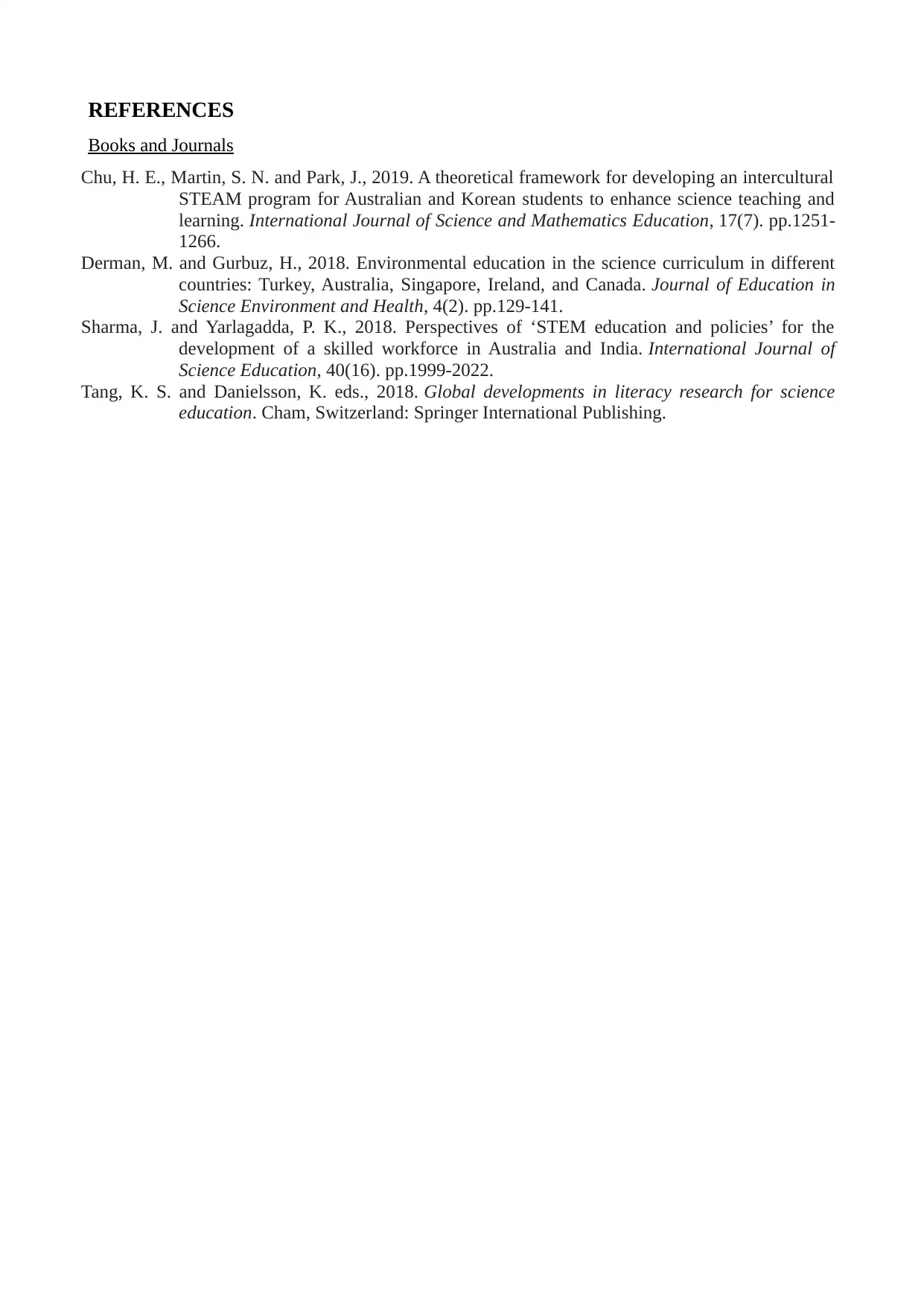
REFERENCES
Books and Journals
Chu, H. E., Martin, S. N. and Park, J., 2019. A theoretical framework for developing an intercultural
STEAM program for Australian and Korean students to enhance science teaching and
learning. International Journal of Science and Mathematics Education, 17(7). pp.1251-
1266.
Derman, M. and Gurbuz, H., 2018. Environmental education in the science curriculum in different
countries: Turkey, Australia, Singapore, Ireland, and Canada. Journal of Education in
Science Environment and Health, 4(2). pp.129-141.
Sharma, J. and Yarlagadda, P. K., 2018. Perspectives of ‘STEM education and policies’ for the
development of a skilled workforce in Australia and India. International Journal of
Science Education, 40(16). pp.1999-2022.
Tang, K. S. and Danielsson, K. eds., 2018. Global developments in literacy research for science
education. Cham, Switzerland: Springer International Publishing.
Books and Journals
Chu, H. E., Martin, S. N. and Park, J., 2019. A theoretical framework for developing an intercultural
STEAM program for Australian and Korean students to enhance science teaching and
learning. International Journal of Science and Mathematics Education, 17(7). pp.1251-
1266.
Derman, M. and Gurbuz, H., 2018. Environmental education in the science curriculum in different
countries: Turkey, Australia, Singapore, Ireland, and Canada. Journal of Education in
Science Environment and Health, 4(2). pp.129-141.
Sharma, J. and Yarlagadda, P. K., 2018. Perspectives of ‘STEM education and policies’ for the
development of a skilled workforce in Australia and India. International Journal of
Science Education, 40(16). pp.1999-2022.
Tang, K. S. and Danielsson, K. eds., 2018. Global developments in literacy research for science
education. Cham, Switzerland: Springer International Publishing.
⊘ This is a preview!⊘
Do you want full access?
Subscribe today to unlock all pages.

Trusted by 1+ million students worldwide
1 out of 6
Related Documents
Your All-in-One AI-Powered Toolkit for Academic Success.
+13062052269
info@desklib.com
Available 24*7 on WhatsApp / Email
![[object Object]](/_next/static/media/star-bottom.7253800d.svg)
Unlock your academic potential
Copyright © 2020–2026 A2Z Services. All Rights Reserved. Developed and managed by ZUCOL.





